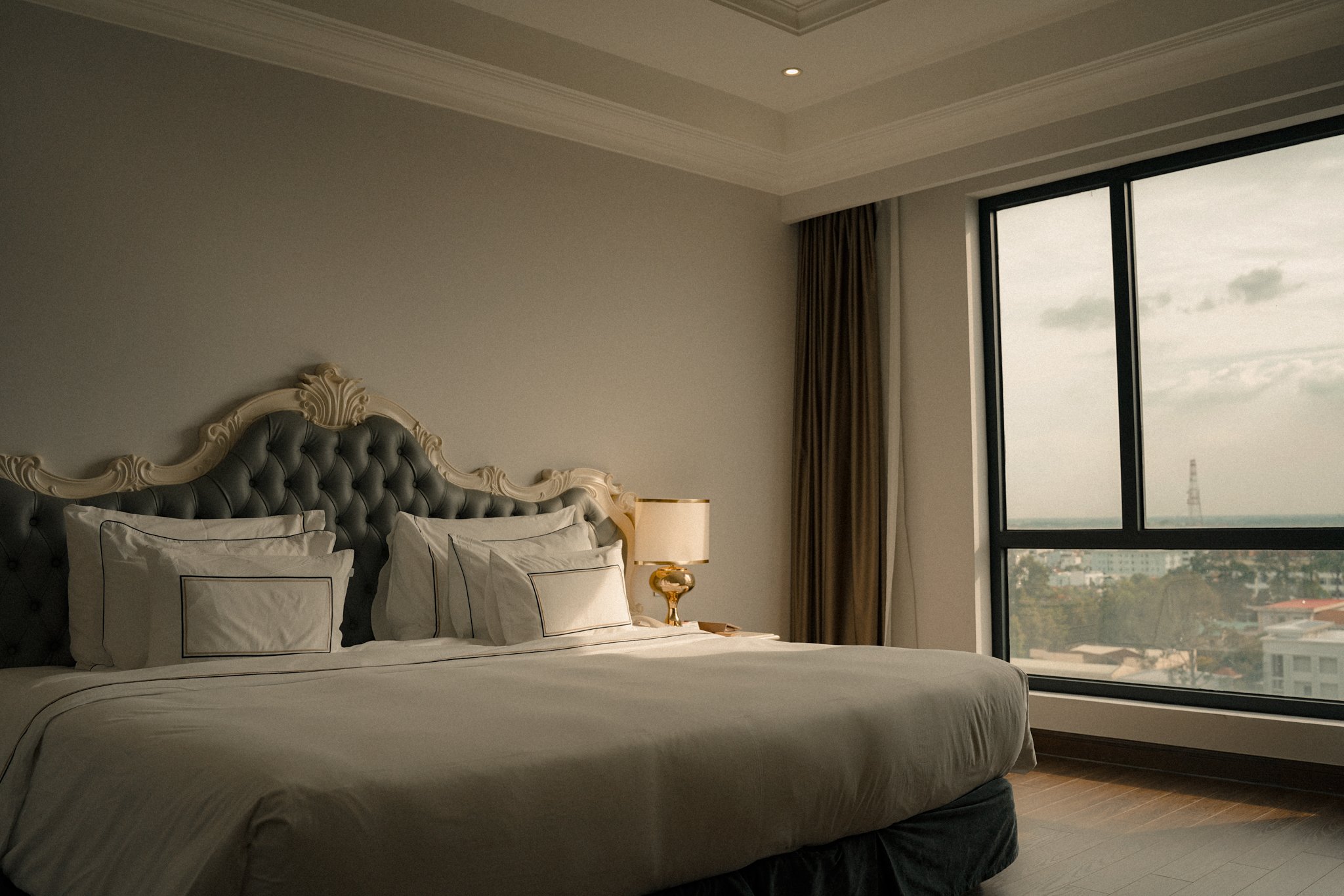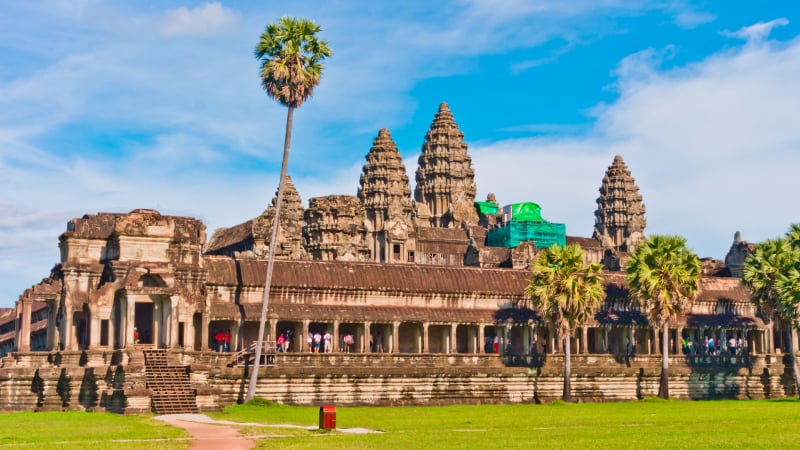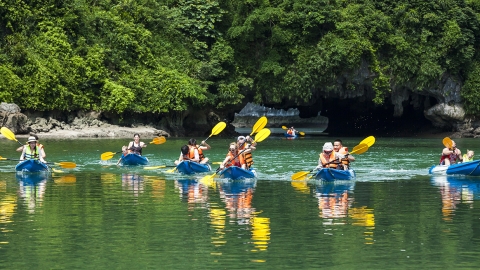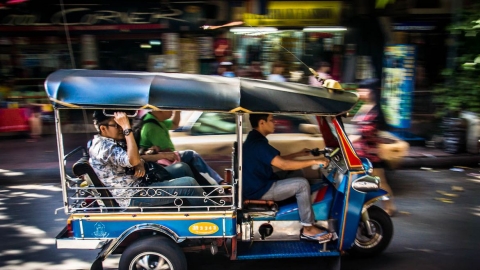Sophisticated scams are flourishing on social media.
Typing phrases like "beautiful and affordable homestays in Da Lat" or "hotels in Moc Chau with tea hill views" into a search engine easily reveals dozens of fan pages with eye-catching images, well-written content, and attractive service promises. However, many of these are traps set up for fraudulent purposes.
On numerous Facebook travel groups, posts have been appearing warning about being scammed out of deposit money or room reservation transfers, only to find out later that the advertised homestay doesn't exist.
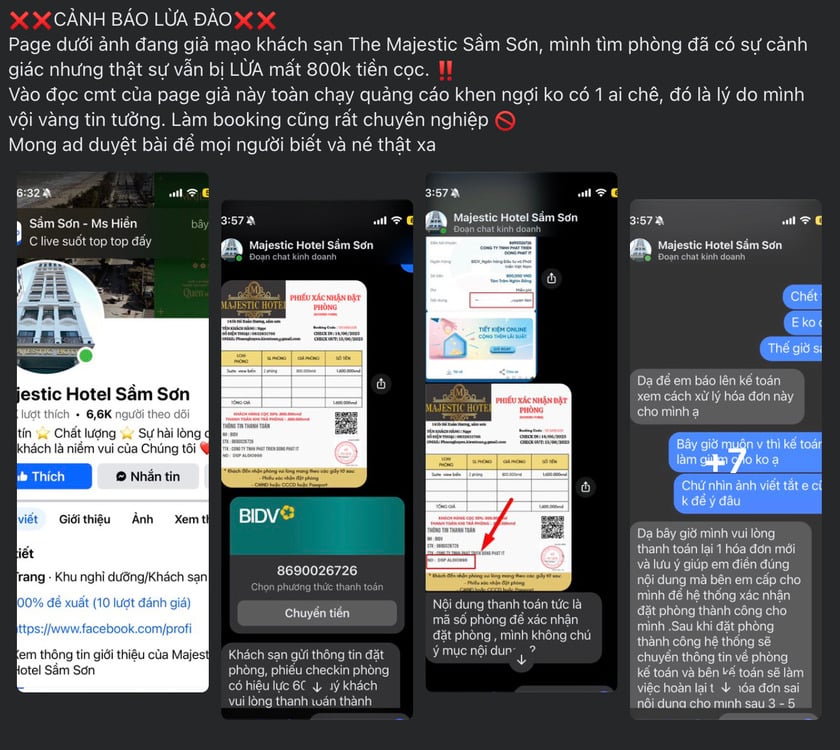
Articles sharing travelers' experiences of being scammed while booking accommodations are constantly appearing in online social media groups.
The websites of provincial and city police departments have also posted warnings about the situation where many victims lose their deposits when booking rooms at resorts, hotels, and homestays through fan pages or websites of unknown origin.
The scammers' tactics are as follows: they create fan pages with names, images, and content similar to reputable accommodation establishments. They post attractive images and offer prices lower than the market rate to attract customers. Some even use automated chatbots and fake bookings with brand logos to create a professional impression, leading many to be unsuspecting and not verify the information carefully. They request customers to transfer a deposit in advance, then become unreachable or block communication.
"Fake pages get more interaction than real pages" - The plight of those who run legitimate pages.
Nguyen Ngoc Anh, manager of Kumo Chan Hotel in Moc Chau, said the hotel also discovered a fake page about 6 months ago. What's noteworthy is that this fake fan page had even higher likes and interactions than the official page, thanks to heavy advertising with attractive promotional content and ridiculously low prices.
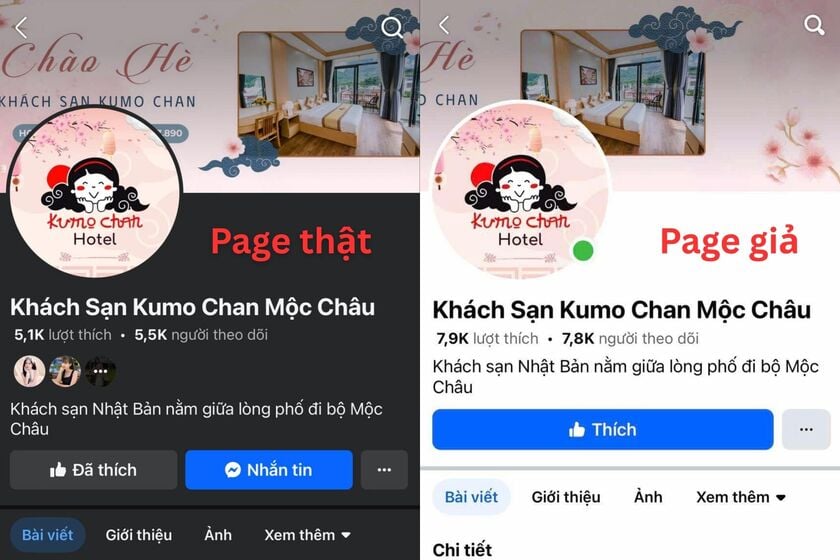
The fake page has more likes than the real page, causing many people to be confused.
"The victims are usually infrequent travelers who lack experience and haven't done their research. Fake pages offer enthusiastic advice and attractive prices. Customers transfer money to personal accounts to reserve rooms as instructed, only to find out they've been scammed upon arrival. Some lose a few hundred thousand dong, but in some cases, the losses exceed ten million dong," Anh shared.
Mr. Phan Thanh Tung, Business Director of Voco Quang Binh Resort, said that to date, the resort has received and assisted about 7 cases of customers being scammed through fake pages. A similar situation also occurred in Tam Dao town, Vinh Phuc province. Duong Kim Quy, a receptionist at 90s Homestay, said that the homestay had detected several fake pages since last year and posted warnings with matching images, but many customers were still scammed, especially during the recent April 30th holiday. Many people only discovered they had booked through the wrong page upon arrival, or had transferred money to a personal account and were then blocked from contact. "Some people lost tens of millions of dong when they fell for the erroneous transfer, then continued to transfer money a second and third time to the fake page after being promised a refund of the money lost due to the previous error," Quy shared.
Tourist hotspots are riddled with "traps".
The phenomenon of fake fanpages is believed to have emerged in the last 1-2 years, but has particularly surged in the past year, coinciding with a rapid increase in domestic tourism demand. Popular destinations such as Sapa, Ta Xua, Da Lat, Tam Dao, Moc Chau, Ninh Binh, Da Nang, Hue, Khanh Hoa, Vung Tau, etc., have become frequent targets for scammers.
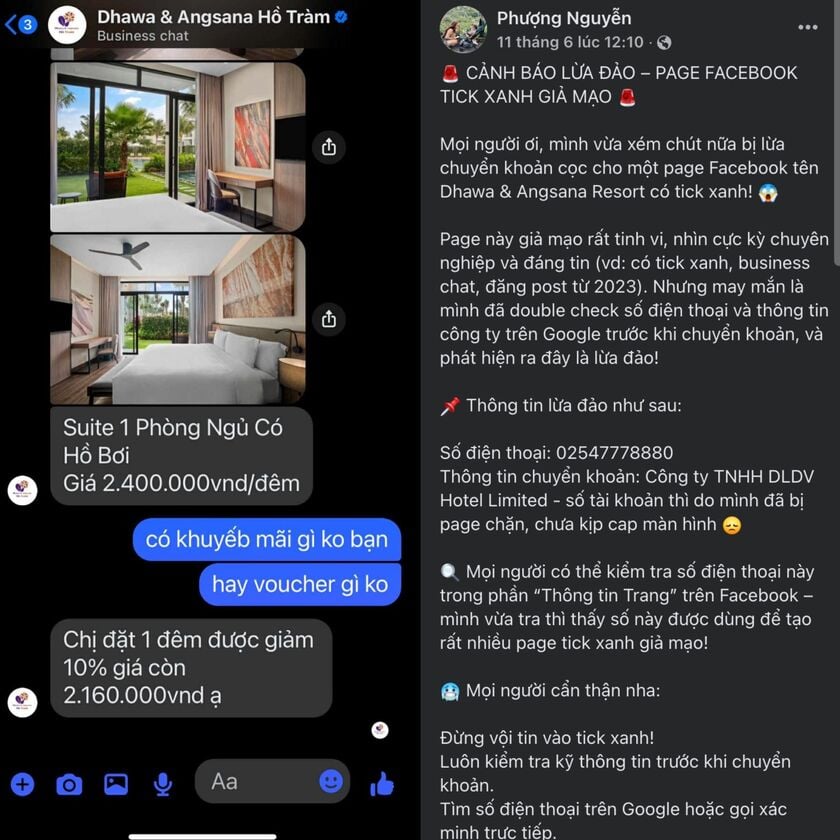
Hotels in popular tourist destinations become targets for fake pages.
Not only Kumo Chan or 90s Homestay, but hotels like EDEN HUE, Dom Dom House Da Lat, Mountain Lodge Hotel Mang Den, AN Retreats Ninh Binh… have also issued warnings on social media with comparison images between real and fake pages. Notably, in many cases, fake pages have higher interaction, comments, and likes thanks to strong advertising, eye-catching content, and professional chat. Even when detected and reported by establishments, these pages even use multiple fake accounts to delete or cover up negative reviews, making customers overlook them.
Huynh Minh Trong, a tour guide on Phu Quy Island, said he has also encountered many cases of his tourists being scammed during the current peak season. Victims shared that they unknowingly came across these pages through advertisements or while searching for accommodation. With unusually low prices and a quick booking process, they transferred money without considering the risk of being scammed.
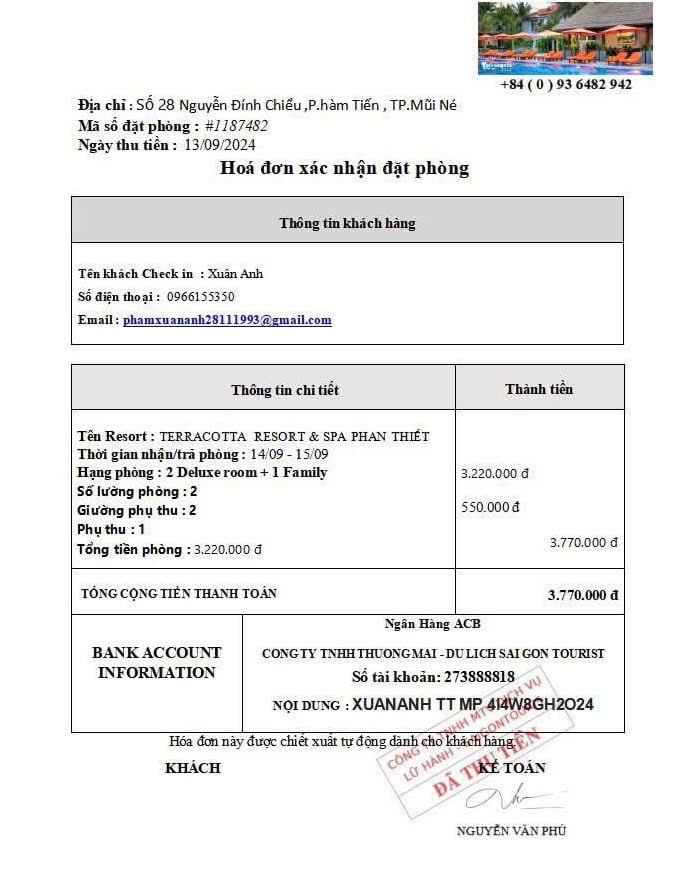
Fake booking pages send information to customers that is just as professional as genuine pages.
Consumers lose money, and businesses lose reputation.
According to Nguyen Canh Linh, a representative of Top Ten Travel, the damage caused by fake pages goes beyond just finances. For many tourists, losing their deposit means losing their entire trip, having to scramble to find new accommodation, or even canceling their itinerary. More seriously, legitimate businesses also suffer reputational damage.
According to Phan Thanh Tung, Sales Director of Voco Quang Binh Resort, the proliferation of fake pages seriously affects the reputation of accommodation businesses, causing customers to lose trust and be misled into believing that the services are not transparent or of poor quality.
Homestays and hotels are forced to spend extra time explaining the situation to guests, posting warnings regularly, and even reporting fake pages to Facebook multiple times, yet they still cannot completely eliminate them.
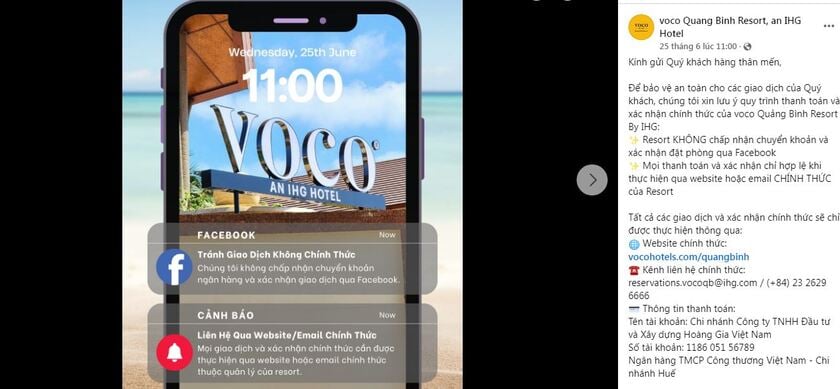
Voco Quang Binh Resort, part of the IHG group, also issued a warning to tourists regarding bank transfer transactions.
"Sadly, some customers who were scammed ended up giving one-star reviews to the real fanpage, making it difficult for us to maintain our reputation," added Ngoc Anh, manager of Kumo Chan Hotel.
Representatives from companies and businesses believe that if this situation continues, it will further tarnish the image of Vietnam's tourism industry in the eyes of both domestic and international tourists.
Legal loopholes and liability arising from social media platforms.
Although online fraud is illegal, current enforcement has not kept pace with the evolving nature of this new type of fraud. Perpetrators often use fake information and accounts, making investigations difficult.
As someone with experience in media, Linh believes that platforms like Facebook, TikTok, and Instagram need to strengthen the criteria for verifying business fan pages and create mechanisms for receiving and processing reports of impersonation more quickly. Many fake pages still exist despite being reported, causing consumers to continue falling into the trap.
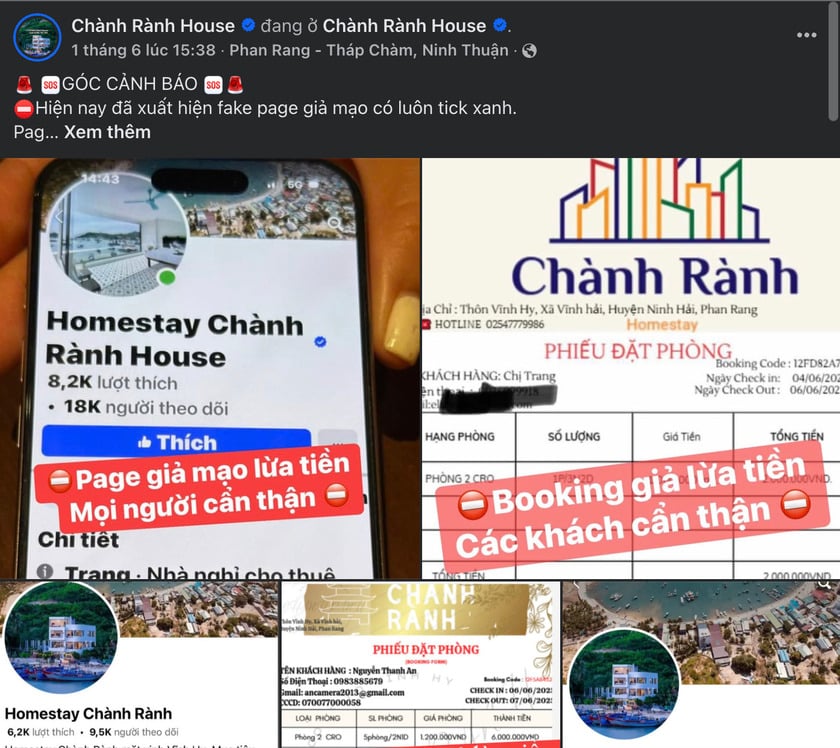
The fake page even has a blue verification tick from Facebook.
In the age of digital travel, every booking click requires vigilance. Even though the tourism market is recovering positively, unchecked fraud and scams will seriously damage consumer trust and the image of the tourism industry as a whole.
From a business perspective, Mr. Phan Thanh Tung advises customers to verify the reliability of hotels and homestays based on the email address of the accommodation provider, which is usually the business's own email address (for example, Voco Quang Binh Resort uses igh.com). Large resorts usually do not accept bank transfers or bookings via Facebook, but instead use their official website. From a personal perspective, Nguyen Ngoc Anh believes: "When booking, don't just look at the number of likes or images on the fan page. Be wary of unbelievable price offers hidden in advertisements. These are often suspicious signs."
On the website, the police recommend that customers absolutely do not transfer deposit money without verifying the information. Always check the authenticity of the fanpage through the "Page Transparency" section in the introduction; check the fanpage name change history (multiple name changes are a suspicious sign); check the administrator's position (most fake pages are run by individuals in Cambodia or abroad).
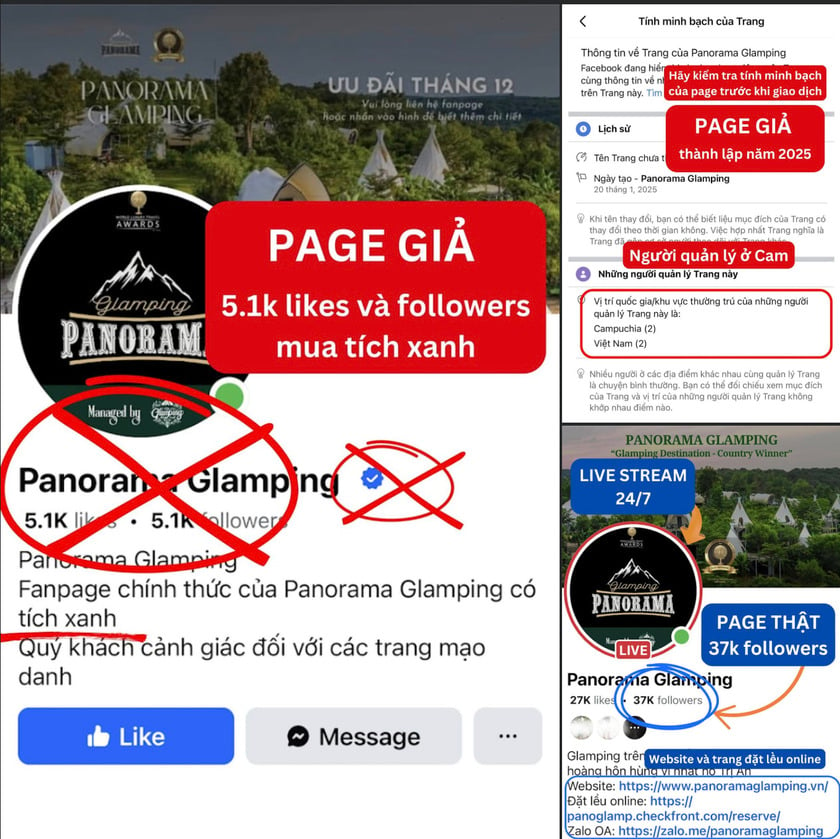
Hotels post warnings and instructions on how to verify their credibility through information on their pages.
Representatives from hotels, travel companies, and tour guides advise tourists to compare hotel and homestay information on various platforms such as Instagram, TikTok, and especially Google Maps – where most phone numbers are verified and reviews are genuine. Before making a transfer, customers can post questions about credibility in groups or contact local tour guides for further verification. Tourists can also book rooms through booking apps, where hotels and homestays have often been personally verified by the operators.
Besides waiting for a clear legal framework and effective protection systems from social media platforms, tourists should equip themselves with information verification skills, be wary of "unbelievable" offers, and always verify the origin of fan pages before placing their trust in them.

 VI
VI EN
EN




